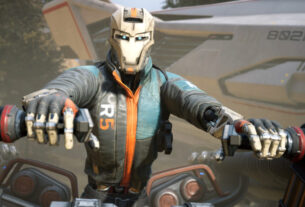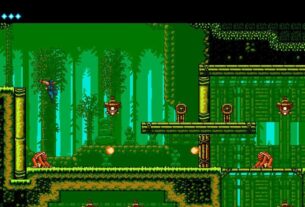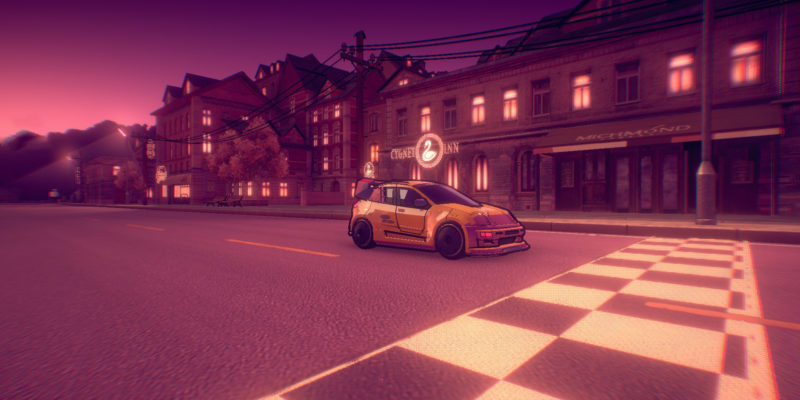
Inertial Drift is the only game to feature drifting more satisfying than Mario Kart. It is the de facto high-octane racing experience for anyone who spent their childhood hopped up on Initial D and Teriyaki Boyz. The game fuses anime-inspired aesthetics with intuitive, arcade-like gameplay to deliver a blast of adrenaline that few games can accomplish with such simple controls. Level 91 has delivered a masterclass in distilling the spirit of a complex sport to a single system.
Welcome to a retro-futuristic anime paradise, where the roads are always clear and the racers are hungry for competition. Inertial Drift is simple, sleek, and far from realistic, but the details ensure every turn is felt on a visceral level. The moment-to-moment intensity is unparalleled, and the controller feedback is good enough to raise hairs. The game feels at its best when paired with a controller, but of course, vibrations can be disabled.
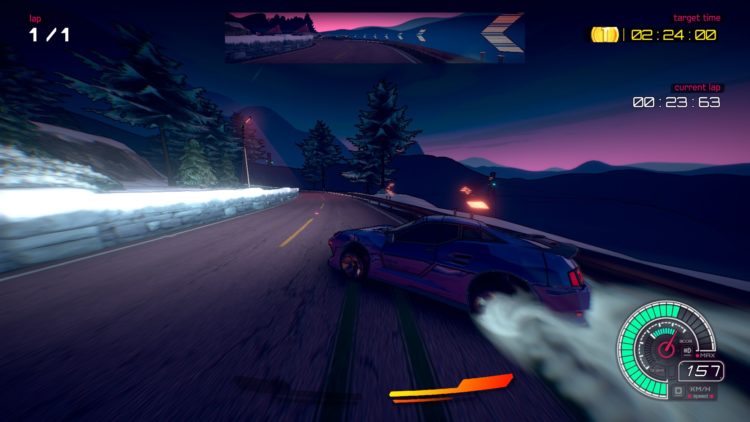
Nighttime joy ride.
If you catch my drift
Two joysticks and two buttons are all you need for your evening cruise. Considered a “twin-stick racer,” Inertial Drift’s vehicles use one joystick for drifting and the other for making slight adjustments to direction. Manipulating both is vital to clearing curves unscathed. Combined with the acceleration and braking, drivers have fine-tuned control over the length and intensity of each drift. Slamming the breaks while drifting slows you down, but is necessary to clear harsher turns. Holding down the accelerator might help with straights, but could leave you ill-prepared for an upcoming bend.
That’s all you need to start racing, but while simple, there is a devilishly high skill ceiling. The controls are incredibly intuitive; their simplicity encouraged me to keep experimenting. Minor tweaks might only save you a fraction of a second, but that’s often the difference between first and last. Events are so precise that I often found myself throwing up identical times down to the millisecond, lap after lap. That feeling of shaving off a fraction of second from your record — unbelievably gratifying.
The 16 vehicles handle slightly differently, but that translates to huge changes in the actual races. One car could have phenomenal acceleration, but is poor at steep turns, while another may be more difficult to tame when drifting. They all have their strengths; some will shine on certain tracks, but require more care on others. Vehicles also come in three classes: race, performance, and sport. Consider these built-in difficulty options with sport (Class C) being the easiest and race (Class A) the hardest. Also notable is how each car comes with its own driver, showcasing not only a diverse cast of characters, but the amount of effort that went into making each vehicle unique — from handling to personality.
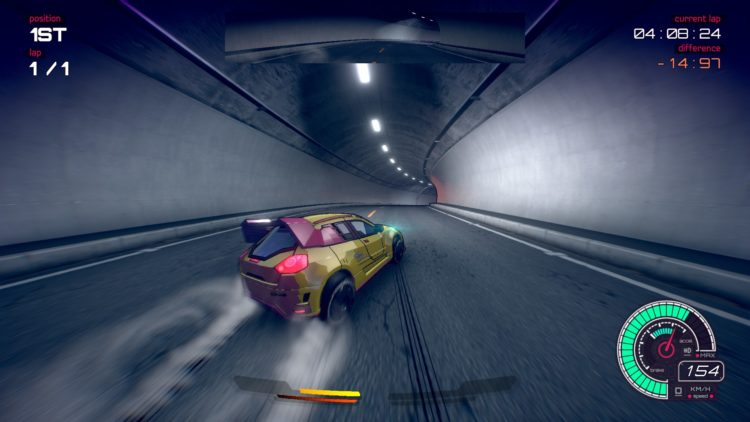
The tunnels are the best.
Straight roads don’t make skillful drivers
Every track has its own distinct identity and cadence. As you throw yourself and your vehicle of choice against the tracks, every bump and bend will burn itself into your muscle memory. But while learning each track, a few odd turns might lack the appropriate visual signifiers, leading to frustrating crashes. Each one provides its own mood, both visually and in its design. Certain tracks might have you make rough turns in succession, while others encourage you to maintain high speeds. Reversed tracks are also available and are their own brand of challenging, doubling the track list from 10 to 20.
To maximize your time on each track, Inertial Drift offers myriad events including time trials, duels, endurance, and style challenges. Every event highlights a certain aspect of the street racing experience. A duel pits you against one opponent where the leading car earns points towards the goal of 1000. A style challenge, on the other hand, takes the emphasis away from speed and puts it on clean, tricky drifts. High-score junkies will easily sink dozens of hours into the game.
In the story mode, you can explore each event type on a number of maps. It adopts a visual novel storytelling style, introducing you to a handful of the game’s colorful cast. While the story itself is just a device to get you racing on different tracks, it’s a welcome addition. The mode functions as more of a tutorial, letting you explore the nuances of each vehicle type. This means a lot of repetition, bordering on tedium, but there’s enough variety to stave off mundanity. At any time, you can create a new save file and choose another character that better suit your playstyle.
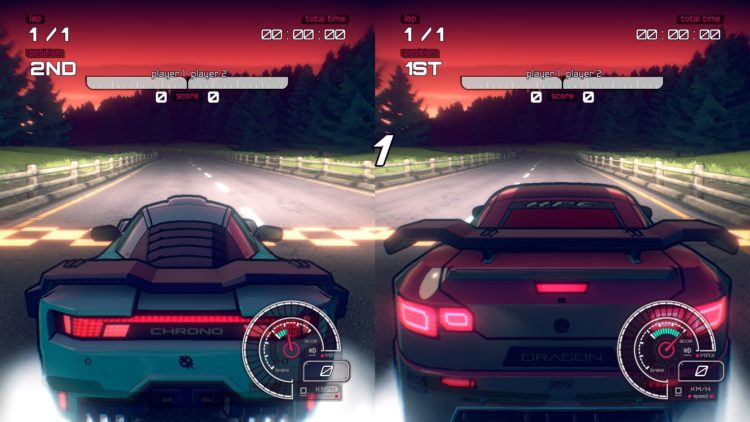
Two times the mayhem.
Shut up and drive
Inertial Drift has a host of other modes for you to test your drifting skills. In the challenge mode, each car is paired with a specific track and event for a tailored test of skill. Completing events can earn you new cars (and characters) to take into other modes. Similar to the challenge mode, Grand Prix offers a set of five events for you to overcome. To practice for these tough events, arcade mode lets you mix and match cars, events, and tracks however you please. It’s a cathartic experience when you want it to be, and a tough challenge when the time calls for it. Split-screen and online play are also available, with online letting you choose your vehicle class for the appropriate challenge.
Racer after racer, gimmick after gimmick, nothing seemed to overcome the roadblock that was my short attention span. However, Inertial Drift gave me a warm welcome with its simple mechanics and intuitive design. The best part of all, is that beyond its opening hour, there’s a long road to mastery ahead. While the number of tracks can feel limited at times, it’s obvious that each one was crafted with the utmost care. All of the modes, events, and vehicles help squeeze out every ounce of fun.
Inertial Drift
Inertial Drift fuses anime-inspired aesthetics with intuitive, arcade-like gameplay to deliver a blast of adrenaline that few games can accomplish with such simple controls.

